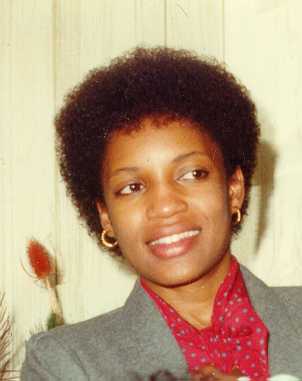Emeagwali
|
By Willie Givens When
Dale Brown Emeagwali was a child, she
had dreams of becoming
a scientist. But she did not anticipate the depth of her ambition.
She was studious
- always at the top of her class. She had the support
of her parents
who, though not academicians, encouraged her pursuits,
even helping
her at home with simple experiments. Today, this renowned microbiologist is
celebrating her achievements,
the latest - the National Technical Association's
"1996 Scientist
of the Year" award. The citation was presented
to Dr. Emeagwali, Oct.
18, at the annual National Technical
Achiever-of-the-year Awards
Banquet at the Marriott Airport Hotel in
Cleveland. Congressman Louis
Stokes, (D-Ohio) presented the award. Dr. Emeagwali was one of six African
Americans honored at the convention.
She was honored for her contributions to
the field of microbiology,
molecular biology and biochemistry. The award recognizes researches regarded as
role models and inspirations
to other scientists whose discoveries have
benefited mankind. Dr. Emeagwali gives the most credit for
her success as a scientist
to her parents, Leon and Doris Brown. Mr. Brown retired from the AFRO-American in
1988 after serving the
paper for 42 years, primarily as superintendent
of the production
department. Her mother is a retired Baltimore
city public school teacher.
Dr. Emeagwali was born in the Poplar
Grove-Lafayette Avenue section
of the city. She attended Alexander
Hamilton Elementary School # 145,
and went on to Northwestern High School,
graduation in 1972. She entered Coppin State College and
graduate in 1976. In the Fall
of that year, Dr. Emeagwali enrolled at
Georgetown University School
of Medicine in Washington. She was awarded
the Doctor of Philosophy
in microbiology, in 1981.
She credits her success at
Georgetown to "good teachers as good training"
at Coppin State, we well as a
summer internship at Meharry Medical
School. The move to Georgetown and away
from her family was a "cultural shock,
" she said. Of coping with the challenges she
says: "I was always ahead in my
class and I held on to that ambition.
I felt I had the ability to
easily assimilate, regardless of race of class." While a research fellow at the University of Minnesota, Mrs. Emeagwali
and her husband, Philip, a Nigerian-born scientists, spearheaded,
among other things, the annual African American Science Day, organized
by staff members at the Science Museum of Minnesota.
The project was designed to provide role models
for African-American
kids. While keeping kids interested in science is a problem that - crosses
racial lines, she said it is particularly acute in the Black culture.
Dr. Emeagwali, encountered more than a few obstacles growing up, which
she said made her even more determined to become a scientist. She
grew up at a time when Black people were told, "You can't do math.
We were taught inadvertently, and sometimes directly, that we couldn'
t do that," she said. "When a Black child said he wanted to be a doctor,
he was slapped upside the head and told to stop being simple." Drawing from her childhood experiences. Dr. Emeagwali has always maintained
that the success of children depends on the character of their parents.
"Parents must always stress the importance of education and achievement
to their children. When kids know there are low expectations, they
won't rise," she says. She said she also held strongly to the belief that learning should
be broadly focused to include math, literature and engineering. "It'
s important not awards and honors including listings in Who's Who
in the World, the World Who's Who of Women, Who's Who in American
Education, International Who's Who in Medicine. She has been awarded a number of prestigious fellowship-from the Uniformed
Services University Health Sciences, National Institutes of Health,
Damon Runyon Walter Winchell Cancer Fund, American Cancer Society,
and the National Science Foundation. She also received doctoral fellowship Fund, ad a national scholarship
from the Delta Sigma Theta Sorority. Additionally, other accomplishments include the discovery of the existence
of isozymes of kynurenine formamidase in the basterium Streptomyces
parvulus which, prior to her findings, were known only to exist in
higher organisms. Dr. Emeagwali also proved that cancer gene expression could be inhibited
by antisense methodoloy, which she says can led to better treatment
for cancer. Early this year, Dr. Emeagwali happily returned to her native Baltimore-
her family and friends-and joined the biology faculty at Morgan State
University. Her hobbies include karate, painting and publishing poems, one of
which appeared in the "Atlantic Monthly." She and her husband have
one son. Related Pages
Dale Emeagwali was born on December 24, 1954
in Baltimore, Maryland.
Click on emeagwali.com for more information.
|



